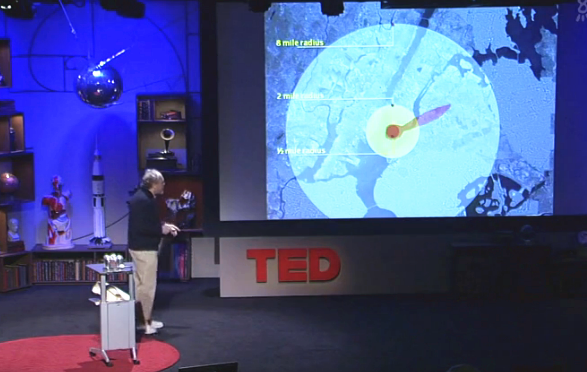And what happens is -- this is -- I'm going to show you now some fallout plumes.
接下来将要发生的-这是-我现在要向大家演示放射性坠尘。
Within 20 minutes, it comes straight down.
在20分钟内,坠尘直线下落;
Within 24 hours, lethal radiation is going out with prevailing winds,
24小时内,致命的辐射将随着盛行风飘散
and it's mostly in this particular direction -- it's going northeast.
基本上沿着某一特定方向向东北方飘去
And if you're in this vicinity, you've got to get away.
如果你在这附近,就得设法逃离
So you're feeling the wind -- and this tremendous wind now that you're going to be feeling --
如果你感觉到了风,感觉到这股强劲的风
and you want to go perpendicular to the wind or downwind,
你就应该沿着垂直与风向的方向逃走或者顺着风的方向
if you are in fact able to see where the blast was in front of you.
如果你能看到爆炸发生的地方的话
You've got to get out of there.
你必须赶快离开那儿

If you don't get out of there, you're going to be exposed to lethal radiation in very short order.
如果你没有迅速离开,你很快就会近距离暴露在致命的辐射中
If you can't get out of there, we want you to go into a shelter and stay there.
如果你无法离开那里,我希望你能找一个避难所躲起来
Now, in a shelter in an urban area means you have to be either in a basement as deep as possible,
躲在城市里的避难所指的是,要么躲在地下室,越深越好
or you have to be on a floor -- on a high floor --
要么躲在楼上,越高越好
if it's a ground burst explosion, which it would be, higher than the ninth floor.
如果是爆炸发生在地面上,辐射尘可能会到达9楼。
So you have to be tenth floor or higher, or in the basement.
所以你需要跑到10楼或者更高的楼层,或者躲到地下室
But basically, you've got to get out of town as quickly as possible.
但总的来说,你需要尽快离开这座城市,越快越好
And if you do that, you actually can survive a nuclear blast.
如果你这么做了,你其实是可以在一次核爆炸中生还的
Over the next few days to a week, there will be a radiation cloud,
在之后的几天到一周内,如有辐射云
again, going with the wind, and settling down for another 15 or 20 miles out
同样随着风,然后下落,继续往前推进15到20英里
in this case, over Long Island.
在这个例子中会飘过长岛
And if you're in the direct fallout zone here,
如果你处于放射性坠尘经过的区域
you really have to either be sheltered or you have to get out of there,
你真的需要躲进避难所或者尽快离开
and that's clear. But if you are sheltered, you can actually survive.
这很明显。但那是如果你能躲进避难所,你确实可以生还
The difference between knowing information of what you're going to do personally,
每个人是否知道应该如何逃生
and not knowing information, can save your life,
所带来的区别
and it could mean the difference between 150,000 to 200,000 fatalities
影响了最终的死亡人数是15万还是20万
from something like this and half a million to 700,000 fatalities.
在这个例子中,将意味着死亡人数能否从70万减少到50万
So, response planning in the twenty-first century is both possible and is essential.
所以,21世纪的核应急预案不仅是可能的而且是必须的
But in 2008, there isn't one single American city
但是直到2008年,全美国没有一个城市
that has done effective plans to deal with a nuclear detonation disaster.
拥有有效的应急预案来应对一次核爆炸灾难
Part of the problem is that the emergency planners themselves,
部分原因是应急预案的制定者,
personally, are overwhelmed psychologically by the thought of nuclear catastrophe.
他们自己都已经被核灾难这一想法从心理上击溃了
They are paralyzed.
他们不知所措。
You say "nuclear" to them, and they're thinking,
你如果和他们说起“核”,他们会想,
"Oh my God, we're all gone. What's the point? It's futile."
“天啊,我们全都得死。还有什么可说的呢?这都是徒劳。”
And we're trying to tell them, "It's not futile.
我们所尝试的就是告诉他们这其实并非徒劳:
We can change the survival rates by doing some commonsensical things."
我们可以通过做一些常识普及的工作来提高生还比例
So the goal here is to minimize fatalities.
我们的目标是将死亡人数降至最低
And I just want to leave you with the personal points that I think you might be interested in.
我希望留给大家一些个人的看法,我认为你们可能会感兴趣的。
The key to surviving a nuclear blast is getting out, and not going into harm's way.
在核爆炸中生存的关键就是逃出去,并且不要误入危险区域
That's basically all we're going to be talking about here.
这基本上就是我们接下来要讨论的全部内容












